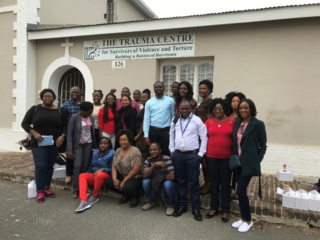Health
De-Stigmatizing Mental Health
A new video addresses stigmatization of mental illness in Africa.
Posted June 2, 2021 Reviewed by Chloe Williams
Key points
- Stigmatization can lead to social isolation and distress, and it adds to the burden of mental illness across cultures and continents.
- "Let's Unite for Mental Health" is a video developed by participants in a global mental health program to address stigmatization in Africa.
- The video highlights that all people may struggle with their emotions and circumstances and challenges myths about mental illness.
This post was co-authored with Dr. Kate Murray from Queensland University of Technology and Jana Katharina Denkinger from the Department of Psychosomatic Medicine and Psychotherapy, University Hospital Tübingen, Tübingen, Germany.
Prejudice and negative opinions have long served to exclude people who may present with symptoms which we, in the West, associate with mental illness. In this blog post, we describe some background and a project aimed at addressing stigma in a low resource African context, titled "Let’s Unite for Mental Health."
We discussed stigmatization in a previous post. In this post, we will outline a recently completed video project for enhancing awareness of stigmatization in an African context and ways in which public perceptions may be addressed.
Sociologist Erving Goffman defined the concept of stigma in 1963 as “an attribute that is deeply discrediting” and reduces the stigmatized person “from a whole and usual person to a tainted discounted one.” Almost 60 years later, there are still various stigmas associated with mental illness globally, leading experts to speak of a health crisis of mental health stigma (The Lancet, 2016). The behaviors and experiences of people who deviate markedly from the “norms” of the community are often subject to prejudice and a host of “causal attributes” which may add to difficulties experienced by the person or, in case of mental illness, have even been described as worse than the condition itself. Consequences of stigma include social isolation, distress and difficulties in engaging in normative behaviors within the community.
Opinions around unusual mental experiences and behaviour differ widely across cultures. Within Western culture, we have a medical model based upon the rational principles of science and a search for underlying etiologies, culminating in the diagnosis of a range of conditions using shared diagnostic systems, most commonly, the DSM-5 and the ICD-11. Both of these documents refer to conditions ranging from organic-based mental conditions of known etiology to the psychoses, mood disorders, as well as conditions that express themselves in terms of relational patterns, such as personality disorders.
Indigenous Conceptions of Mental States
Within a more traditional African context, one of us undertook research in Southern Africa some four decades ago on the meaning of “categories of experience,” which may be categorized as mental illness in a Western biomedical context. The explanations for people’s experiences were quite different. The research was undertaken in the Ciskei area, and involved observing and having in-depth conversations with an indigenous healer (Igqira), Mongezi Thiso, and his “patients” or novices.
In the simplest formulation, the healers within the Xhosa-speaking context described causation as being central to their nosology and understanding. So-called “mental illness” fell into two clusters: conditions that were ascribed to the ancestors, and conditions that were ascribed to “witchcraft.” The experience of hearing voices and wandering in the countryside may well be understood in terms of being “called” by the ancestors to undergo training and become a healer, a process known as ukuthwasa. As such, it was not a stigmatized process, but on the contrary, a meaningful journey. Alternatively, people may “talk gibberish” and be out of their mind, a condition referred to as amafufunyana, which in turn, may be caused by someone wishing to cause harm and placing some kind of poison in the path of the person. From this perspective, having symptoms of mental illnesses can be stigmatized.
There is evidence that interventions designed to reduce mental health stigma and discrimination can lead to positive attitude change, specifically when social interaction and first-person narratives are involved (Thornicroft et al., 2016). However, most studies on mental health stigma take place in a Western context. Interventions and research from a non-Western perspective addressing mental health stigma are therefore indispensable.
Let's Unite for Mental Health Project
As part of an Australian Awards Program on mental health, we met with mental health practitioners from nine African countries (Botswana, Cameroon, Ghana, Kenya, Madagascar, Nigeria, Tanzania, Zambia, and Zimbabwe), first at the Queensland University of Technology in Brisbane, Australia, and then in Cape Town, South Africa. Following several weeks of in-depth discussion, the group identified stigma as a priority in their home countries. The group then applied for funding from the Australian Psychological Society’s Intercultural Committee to fund the making of a video to address stigma in an African context. The project was titled "Let’s Unite for Mental Health."

Drawing upon the expertise of mental health workers, all of whom had responsibilities for mental health in their home countries, we developed a script. It was decided that the script would highlight that all people may, at times, struggle with their emotions and circumstances, and this also includes mental health professionals. The idea was to encourage people to recognize mental health issues not as shortcomings but as common experiences. We were keen to challenge the common myths held about mental illness, to include people whom the viewers may identify with and encourage people to seek help if needed.
The making of the video involved a professional videographer, based in Cape Town, South Africa, and editing was done by QUT in Australia. The video runs for just under two minutes, providing an essential message in mental health awareness. The closed captioning is available in seven languages (English, French, Malagasy, Ndebele, Shona, Swahili, and Tswana). The video is now freely available for distribution and plans are afoot to engage in a dissemination program to coincide with the video as part of World Mental Health Day, organized by the World Health Organisation (WHO) on Sunday, 10 October 2021.
Advantages of Digital Technologies in Addressing Stigmatization
Relying on digital technology, the video has many strengths. For instance, the ownership of cell phones is pervasive in many parts of the African continent and the video can be easily shared through social media or messages. Even if smartphones (capable of accessing the internet) are less widely used, smartphones are more likely to be accessible to people who have adopted contemporary views in relation to mental illness and the stigmas related to people presenting with mental health concerns.
With the video “Let’s Unite for Mental Health,” we aim to provide a low-threshold intervention developed from the perspective of mental health practitioners in the African context to address mental health stigma and normalize mental health problems as well as the daily work of mental health practitioners. We hope to reach various populations within the African context and internationally to disseminate the message that mental health may impact any member of the community and that help is available. Let’s unite for mental health.
References
Thornicroft, N., Clement, S., Evans-Lacko, M. et al. (2016) Evidence for effective interventions to reduce mental-health-related stigma and discrimination, The Lancet, 387, Stigmatisatio10023, 1123-1132, https://doi.org/10.1016/S0140-6736(15)00298-6.




